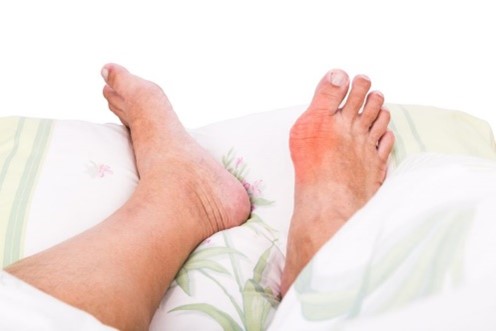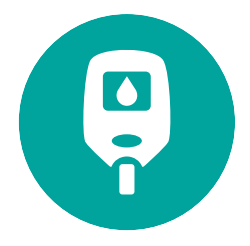The Link between Gout and Kidney Disease

When your kidneys do not work the way that they should, it can lead to gout. It’s important to treat and prevent future attacks of gout as it can lead to permanent joint and bone damage. Since kidney disease and gout are closely related, protecting your kidney function is one way to reduce symptoms of gout.
What Is Gout?

What causes gout and uric acid build up?
Some reasons for high levels of uric acid include:
- Diet. Your body produces uric acid to break down purines, which are found in red meat, beverages sweetened with fruit sugar, alcohol, and some seafood including anchovies, sardines, mussels, scallops, trout, and tuna.
- Weight. If you are overweight, your body may produce more uric acid than it needs.
- Medications. Certain medications, such as those used to treat high blood pressure, can increase the uric acid in your body. Talk to your doctor before taking over-the-counter medications and supplements.
What are the symptoms of gout?
- Severe joint pain. Although gout can affect any joint, it commonly occurs in the big toe, ankles, knees, elbows, wrists, and fingers.
- Inflammation and redness. When the crystals settle in a joint, that joint becomes red, swollen, and tender.
- Limited range of motion. As the crystals form around your joints, you may not be able to move your joints properly, or they may feel stiff.
What Is the connection between gout and kidney disease?
Recent studies have found that compared with people who do not have gout, people with gout are:
- 29 percent more likely to suffer from advanced chronic kidney disease (CKD).3
- 200 percent more likely to have kidney failure.3
Gout can be a warning sign for CKD or may mean you’re at a higher risk for kidney disease. If you’re experiencing symptoms of gout, talk to your doctor to determine the root cause and if kidney disease treatments are necessary. Fortunately, if you are living with gout and kidney disease, you can make lifestyle changes to help prevent symptoms.
How do you treat gout?
- Eat a healthy diet. Following a healthy diet that includes whole grains, fruits, vegetables, and low-fat dairy products can decrease the frequency of gout attacks. Reduce your intake of alcohol, red meat, and high-purine foods.
- Exercise regularly. Exercise can help maintain a healthy weight. It also reduces the amount of uric acid your body produces.
- Ask about medications. If diet and exercise aren’t enough to reduce symptoms of gout, talk to your doctor about medications that may be available to you.
How can you prevent gout if you have kidney disease?
- Follow a healthy kidney-friendly diet. Reducing your sodium and protein intake can help you feel your best while maintaining a healthy weight. However, this doesn’t mean you need to give up all the foods and drinks you love. Check out these kidney-friendly recipes for inspiration.
- Take your medications as prescribed. Certain medications used to treat gout are not safe for your kidneys. Make sure to talk to your doctor about what medications to take and how frequently.
- Monitor your weight. Obesity is a risk factor for gout. When coupled with kidney disease, it may increase your chances of having gout. Work with your care team to develop a plan for reaching and maintaining a healthy weight. Your care team can also help you monitor your weight and keep track of any changes.
- Maintain a healthy blood pressure. Lowering your blood pressure is important for protecting your kidneys and overall health. Your doctor can help you create a treatment plan to take control of your blood pressure.
- Maintain a healthy blood sugar level. Frequent or ongoing high blood sugar can cause damage to your nerves, blood vessels, and kidneys. To help reduce the risk of an attack of gout, it is important to keep your blood sugar levels balanced.
Treating and preventing gout is important to protect your overall health and ensure you feel your best. If you have symptoms of gout, talk to your doctor. It may be a warning sign of CKD. Your doctor and care team can help you determine what lifestyle changes you may need to adopt and what treatment plan is best for you. If you’ve already been diagnosed with CKD, or are just looking to learn more, take our free class to learn how to best manage your health and live well with kidney disease.
References
1. Mayo Clinic staff. “Gout.” Mayo Clinic. Last reviewed March 6, 2021. https://www.mayoclinic.org/diseases-conditions/gout/symptoms-causes/syc-20372897.
2. National Kidney Foundation. “Gout and Kidney Disease.” Kidney.org. https://www.kidney.org/atoz/content/gout/gout-kidney-disease.
3. University of Limerick. "Gout 'more than doubles' risk of kidney failure: Largest ever study on subject uses data from more than 620,000 patients in UK health system." ScienceDaily. August 28, 2019. www.sciencedaily.com/releases/2019/08/190828115231.htm.
Suggested topics

Managing Blood Sugar and Chronic Kidney Disease
If you are living with diabetes and kidney disease, it is important to stay in control of your blood sugar so you can be your healthiest and avoid other...
What is Ammonia Breath and Is It a Symptom of CKD?
Chronic kidney disease (CKD) is one possible cause of having an ammonia taste in your mouth, sometimes called “ammonia breath.”
Why Your Doctor May Test for Protein in Urine
Proteinuria, or protein in the urine, occurs when your kidneys aren’t functioning normally, allowing protein to leave your body...

